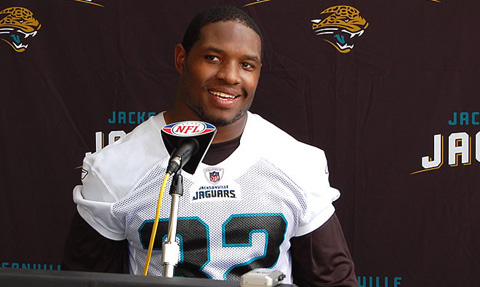3 Things that matter in contract negotiations that we don’t talk about enough
Since the Jags and Maurice Jones-Drew entered their standoff I’ve been reminded of a few things that people don’t seem to understand about contract negotiations and I wanted to quickly address them here.
1. Owners don’t want to be told how to conduct business
2. It’s not just about how ”great” a player is but whether his presence on the team makes “enough” of a difference with all things considered
3. The value of a player can go up or down with a contract already in place prompting either side to request a restructure.
When negotiations and hold outs happen too often people are focused on the fact that the player was given a FAIR deal in the beginning and whether or not the player is “worth” more money based on play alone. But these other factors I’ve mentioned matter just as much and more in many cases.
[To finish reading about why these other factors matter in negotiations click Read More]
A player getting a fair deal when a contract was signed, let’s say three years ago, isn’t completely relevant today. During that three year period many of other players who play at the same position and are in the same class as the player looking for a new deal have skewed the contract values up or down.
When the value is skewed up, a player will ask for a renegotiation. When the value is skewed down (or when the value of OTHER players on the team is skewed up), the team will either request a player to enter a restructure (sometime at the risk of release) OR release the player and re-sign him at a lower value. Which of these options is on the table depends on the class of player, amount of money already guaranteed, salary cap etc.
The fact that the OTHER players on teams aren’t talked about bothers me because it matters a lot. To use Baltimore Ravens FS Ed Reed as an example, three years ago, before newer Ravens defensive players developed into major contributors, Reed probably could have held out and gotten much more money over the remainder of his contract and possibly another year tacked on to it.
But now, the question is not whether Ed Reed can still play at a high level-it’s whether the team believes they NEED Reed to play at that level to make a Superbowl run. Given the capabilities of guys like Bernard Pollard, Lardarius Webb, and Cary Williams the Ravens would probably say the need for Reed doesn’t justify a lucrative contract even if he still performs as an elite DB.
To use another example, last year when OLB Mario Williams was injured and missed games for the Texans the Texans were able to make a good run deep into the playoffs. What the team found out is that they don’t need an elite OLB at the cost Williams commands in order make a Superbowl run. The Texans choosing to let Williams go was not in anyway a knock on his playing ability. Williams was later signed by Buffalo, a team that needs him to play at the level he’s capable of.
MJD is in a different situation than Reed and Williams because the caliber of players around him is worse not better. But it still matters. The Jags are not likely to make the playoffs whether MJD is on the field or on his couch. MJD’s leverage lies in how eager the ticket buying public will be to go see a team that looked largely pathetic against milquetoast defenses in the preseason. New owner Shad Kahn probably doesn’t believe that MJD’s presence will sell enough tickets to justifies a new contract comparable to those of his peers. He could be absolutely wrong cause what fan wants to see their team struggle to move the ball every series…but this is about what the Jags believe not what’s necessarily true.
In relation to the dispute between MJD and Kahn there is also the simple fact that owners, like any other employers, don’t like to be told who to pay and when. In that sense, as we’ve seen time and time again, contracts are as much about the owners’ egos (remember the lockout?) as the player’s skill or the good of the team. Some owners would rather lose games, players, and fan favor than be pressured.







